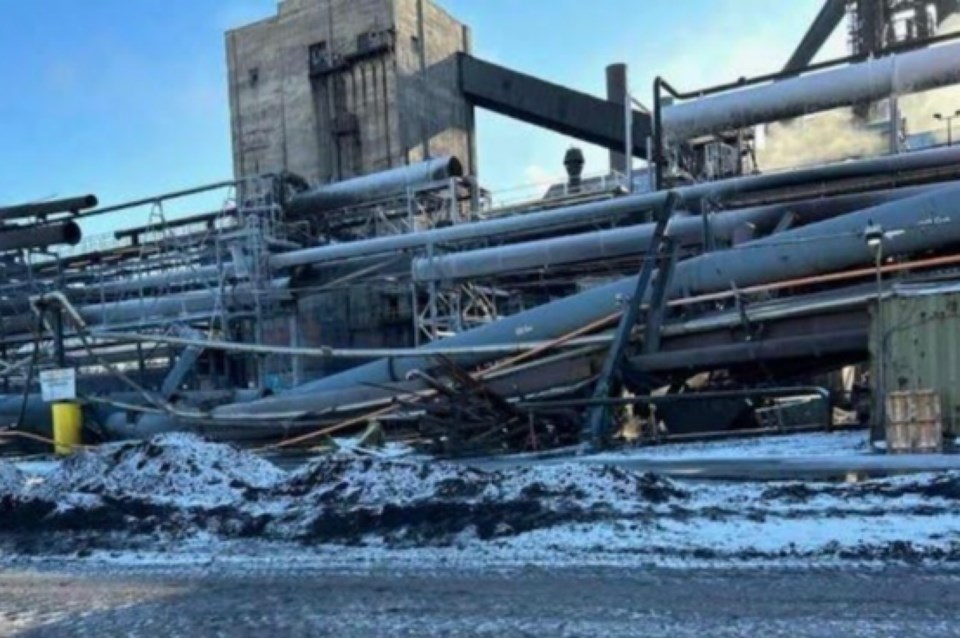Algoma Steel Group Inc. hopes to recover a "significant amount" of the $120 million to $130 million it lost after January's utility corridor piping collapse at its coke-making facility.
"We have been working closely with our insurance providers and adjusters as they complete their assessments," Rajat Marwah, the company's chief financial officer, said during a June 21 conference call with investors.
"While we do expect to recover a significant amount of the losses, the amount and timing of these recoveries are still to be determined," Marwah said.
As SooToday recently reported, the steelmaker estimated in its fourth-quarter financial results that its hot metal production was reduced by approximately 150,000 tons after the structural collapse and the unplanned three-week blast furnace outage that followed it.
As a result, Algoma reported its adjusted EBITDA fell by approximately $120 million to $130 million.
EBITDA stands for 'earnings before interest, tax, depreciation, and amortization' and is considered an important indicator of a company's operating activities.
A more comprehensive explanation of the Jan. 20 incident was filed Friday to Canadian and U.S. securities regulators:
An independent investigation revealed an unforeseen escalating overload condition, resulting in a failure of a structural support member of the utility corridor, thereby causing the subsequent cascading collapse of other support structures.
Minimal production of coke resumed at all three coke oven batteries on January 23, 2024 to maintain asset integrity. When combined with inventories on hand and the availability of third-party coke supplies, the company satisfied its coke requirements for normal steelmaking operations while the repairs to the utility corridor were completed.
While significant progress has been made in the reconstruction of the utility corridor and commissioning of the suction main, and efforts have been undertaken to restore some operational functionality to the coke oven batteries; coke production levels have not stabilized and the batteries are not yet fully operational.
The company has standard insurance coverage that is intended to address events such as these, including business interruption and property damage insurance.
The company has engaged its insurers, and is in the process of submitting claims under its insurance policies for covered losses.
Management’s current estimate for the expected combined impact of lower revenues and higher costs for the duration of the outage is in the range of C$120 million to C$130 million. This impact is driven primarily by lost shipment volume restricted by lower blast furnace production.
In addition, higher production costs experienced post-chill are driven by greater reliance on purchased furnace coke and natural gas, in the absence of normal volumes of internally produced coke and by-product gasses, along with greater utilization of purchased slabs.
These higher costs were mitigated in part by lower labour cost enabled by a temporary partial layoff of unionized workers.
The company and its insurers continue to review the impact of the structural collapse and subsequent lost production as it relates to the insurance claim.
Michael Garcia, Algoma's chief executive officer, told investors on Friday that the most recent quarter was a challenge operationally, with soft market conditions in recent weeks.
"But we are focused on what we can control, operating our existing facilities safely, completing the important upgrades at our plate mill and advancing the electric arc furnace project on schedule and on budget," Garcia said.
"That outage highlighted the challenges of operating facilities that, in some cases, are over 70 years old, but also put on full display the professionalism and expertise of our workforce and their ability to rapidly recover from that incident."
"I'd like to once again thank all of our employees for their hard work, dedication and professionalism, particularly their ability to rapidly and safely bring our facilities back to normal production levels during a challenging period."
Garcia said Algoma Steel has started its exit from the market for wide-coil steel, a move expected to be finalized over the balance of its fiscal year.
"This strategic shift will allow us to prioritize plate production and sales, taking advantage of our position as Canada's only discrete producer of plate products, resulting in a more favourable product mix that is expected to drive meaningful margin enhancement," the CEO said.
"Our results are supported by the fact that plate pricing continues to demonstrate a significant premium as overall demand for plate products remains high.
"This, in turn, continues to benefit our average price realizations especially as we see higher production levels from the plate mill following the most recent planned outage and upgrade."
"Due to the lagging nature of our order book, realized pricing in the quarter reflected higher index pricing from the end of calendar year 2023 flowing through our contract order book. Subsequent to quarter-end, we successfully completed the planned outage related to the modernization of our plate mill."
"In the upcoming quarter, we expect plate mill production to reach approximately 90,000 tons. Our operations and commercial teams are focused on ramping up production and sales of plate products over the balance of the fiscal year, putting us on a path towards our expected annual run rate capacity of over 650,000 net tons," Garcia said.
— SooToday




